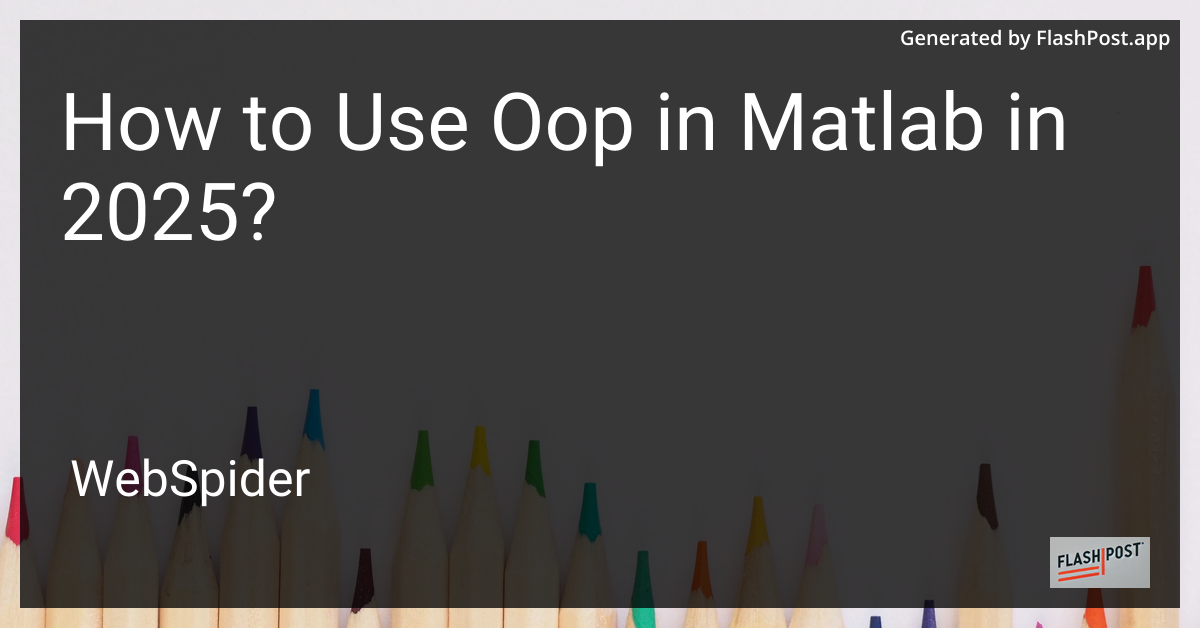
Best Matlab Books to Buy in 2025
| Product | Features | Price |
|---|---|---|
 MATLAB: A Practical Introduction to Programming and Problem Solving |
Get It Today  |
|
 MATLAB for Engineers |
Get It Today  |
|
 MATLAB For Dummies (For Dummies (Computer/Tech)) |
Get It Today  |
|
 MATLAB: A Practical Introduction to Programming and Problem Solving |
Get It Today  |
|
 MATLAB: An Introduction with Applications |
Get It Today  |
Object-Oriented Programming (OOP) in MATLAB continues to evolve, making it critical for engineers and scientists to stay updated with its latest features and capabilities. As of 2025, MATLAB has made significant strides in optimizing OOP, integrating more robust features that facilitate better data encapsulation, inheritance, and polymorphism. In this article, we’ll explore how to harness the power of OOP in MATLAB 2025 for more efficient and organized code.
Why Use OOP in MATLAB?
OOP helps in creating models that mirror real-world systems. By using objects to represent and operate on complex data, OOP enhances code readability, reusability, and modularity. This methodology is particularly beneficial in a collaborative environment where multiple developers might work on interconnected components.
Key Features of OOP in MATLAB 2025
MATLAB 2025 introduces a suite of enhancements to its OOP capabilities:
-
Improved Encapsulation: MATLAB now allows better control of data access, ensuring that data is accessed safely and efficiently.
-
Advanced Inheritance: The 2025 update supports multiple inheritance, allowing classes to derive from multiple parent classes.
-
Dynamic Method Dispatching: Enhanced polymorphism with more intuitive dynamic method dispatching offers greater flexibility in method overriding.
Step-by-Step Guide to Using OOP in MATLAB
Here's how you can effectively implement OOP in your MATLAB projects:
1. Define Classes and Properties
Begin by defining a class to encapsulate the data and behavior:
classdef Vehicle properties Make Model Year end methods function obj = Vehicle(make, model, year) obj.Make = make; obj.Model = model; obj.Year = year; end end end
2. Implement Methods
Enhance your class functionality by adding methods:
methods function age = getVehicleAge(obj, currentYear) age = currentYear - obj.Year; end end
3. Utilize Inheritance
Extend your classes for specialized behavior:
classdef ElectricVehicle < Vehicle properties BatteryCapacity end methods function obj = ElectricVehicle(make, model, year, batteryCapacity) obj@Vehicle(make, model, year); obj.BatteryCapacity = batteryCapacity; end end end
4. Leverage Polymorphism
Polymorphism allows using a single interface to represent different data types:
function displayVehicleDetails(vehicle) fprintf('Make: %s, Model: %s, Year: %d\n', vehicle.Make, vehicle.Model, vehicle.Year); end
The use of polymorphism ensures that this function can handle objects from any derived class of Vehicle.
Conclusion
Implementing OOP in MATLAB 2025 is an effective strategy for building scalable and maintainable software. The improvements in encapsulation, inheritance, and polymorphism provide MATLAB users with tools to better model real-world scenarios and data structures.
For those keen to delve deeper into MATLAB programming techniques, you can explore other fascinating topics such as data manipulation in MATLAB, the latest MATLAB 2025 features, and numerical integration.
Stay current with MATLAB's advancements to leverage its full potential in your computational tasks and projects!